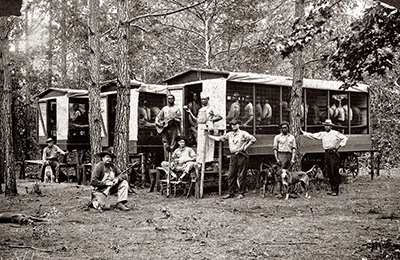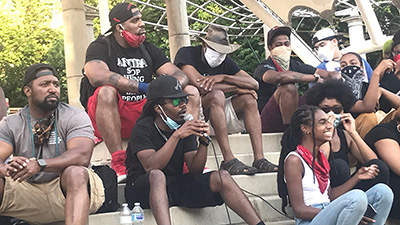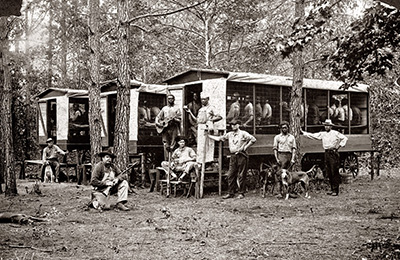Telling the fact about historic previous, apologizing, and paying long-owed cash owed are the start of
therapeutic and reparations for Black Individuals.
Yearly, tons of of 1000’s of vacationers flock to Asheville, North Carolina, a metropolis throughout the majestic Blue Ridge Mountains. Vacationers hop on trolleys and snap footage of Gilded interval mansions and estates. Others uncover mountaineering and biking trails inside hardwood forests.
Like each place, Asheville has a story that is relatively extra superior than what may be gleaned from a journey data. Nonetheless, those who be taught regarding the native impacts of the 1929 stock market crash or pressured elimination of the Cherokee from the land city sits on can sense a historic previous of economic turbulence and despair. For city’s Black residents, this historic previous lives on by way of legacies of enslavement, redlining, and concrete enchancment presently manifesting inside the kind of quick gentrification.
Reparations, Outlined
With this historic previous, Asheville is a snapshot into the nationwide downside of rampant racial injustice. In 2020, it decided to take its first steps into restore by turning into a member of Evanston, Illinois in enacting reparations legal guidelines, with Rhode Island and California following swimsuit rapidly after. Whereas the movement for reparations for Black Individuals has been sluggish, throughout the interval of Black Lives Matter, it’s garnering additional recognition for its vitality to heal, educate, and rework the nation.
“Being born and raised in Asheville, I already had an incredible information base about our native historic previous sooner than I did the formal evaluation. Nevertheless there have been additional points I noticed that made the need for a reparations program clear,” says Robert Thomas, Racial Justice Coalition of Asheville (RJC) group liaison. “Shifting into that deeper historic previous allowed us to make an exquisite case of why we have now to revive the damages accomplished.”
One occasion of that deeper historic previous was Asheville’s convict leasing system. In the middle of the Reconstruction interval after the Civil Warfare, locking up African Individuals for petty crimes like vagrancy was frequent. Many cities, along with Asheville, used unpaid, incarcerated labor—a legalized sort of slavery—to assemble infrastructure that will develop the native monetary system. This included the North Carolina railroad and a variety of resorts; a lot of these employees died all through their incarceration.

To revive this native legacy of systemic racism that endures to the present day, legal guidelines handed in July 2020 by Asheville’s metropolis council delivered a correct apology on behalf of city for sanctioning the institution of slavery, implementing segregation, and destroying burgeoning Black communities with an “metropolis renewal” program.
Asheville’s metropolis council has named funding for functions that may improve homeownership and enterprise options for Black residents as a goal for city, nonetheless Thomas says that direct cash funds are moreover nonetheless on the desk. The RJC is targeting advocating for an inclusive decision-making course of for all grassroots organizations and residents.
Whereas it’s going to presumably take many sorts, what makes reparations completely totally different from divesting and reinvesting functions is specificity and acknowledgment on behalf of an oppressive social gathering. Whereas functions that divest funds from harmful industries and into community-building initiatives like housing and education might revenue a selected group of people that discover themselves harmed as a result of historic practices, these funds aren’t solely allotted to that group and there is not an categorical goal of restitution. The enterprise of slavery contributed to the US’ place as an monetary superpower on the world stage, largely on the expense of social, monetary, and political equality for African Individuals.
In 1860 alone, there have been virtually 4 million enslaved of us recorded throughout the US Census and the estimated value of their pressured labor was $3 billion based mostly on a Harvard School analysis—exhibiting how terribly helpful enslaved labor was to the US monetary system.
Seven hundred miles northwest from Asheville, the small metropolis of Evanston, Illinois, grabbed headlines in 2019 when its metropolis council handed a call to determine a $10 million reparations fund using revenues from cannabis product sales to spend cash on housing assist and monetary enchancment functions for Evanston’s Black residents. Throughout the winter 2020 Inexperienced American, Evanston’s fifth Ward alderman Robin Rue Simmons suggested us that “Black households had been leaving Evanston at an unsettling value because of [a] lack of entry to cheap housing,” highlighting the nimbleness and creativity of native vitality.
Whereas such developments give an encouraging signal to totally different cities attempting to start a reparations course of, college students say there’s nonetheless work to be accomplished by the federal authorities which has collected colossal curiosity on a powerful debt.
A 40-Acre Dream Deferred
After a gathering with a bunch of Black preachers in 1865, Union Regular William T. Sherman issued an order to distribute 40-acre plots of tillable land to freedmen and mandate that the communities formed inside the brand new territory govern themselves undisturbed. Nevertheless, the an identical 12 months, President Andrew Johnson reversed the order and returned these lands once more to Confederate householders.
The US authorities has delivered reparations to Indigenous peoples forcibly away from their lands, Japanese internment camp survivors, and reached a settlement with survivors and households of the Tuskegee Experiment. Nonetheless it has not made any fundamental steps since Sherman’s order in the direction of delivering reparations to African Individuals who descended from enslaved of us.
That’s why Guide Jackson-Lee (D-TX) reintroduced HR-40 in 2021 to create a charge to verify the monetary impacts of slavery and enduring racism and counsel a correct apology. HR-40 has however to go to a vote in Congress, nonetheless in 2020, California made historic previous by turning into the first state to launch its private taskforce to verify and make strategies for reparations.
Whereas those who survived enslavement throughout the nineteenth century and sooner than at the moment are not with us, evaluation displays that Black Persons are nonetheless shackled with monetary inequities. The ratio for white family wealth to Black family wealth is larger for the time being than it was initially of the twentieth century, based mostly on the Brookings Institute. Median web worths for white households have continued to outpace Black ones, with Black households seeing a 44 % decline from 2007 to 2013.
Throughout the 2018 report, “What We Get Flawed About Closing The Racial Wealth Gap,” Duke School economists dispel the parable that the racial wealth gap may be solved by way of personal movement. Black households whose excessive earners graduated from college have about 33 % a lot much less wealth than white households whose excessive earners dropped out of highschool, based mostly on the Pew Evaluation Coronary heart. (Be taught additional regarding the monetary costs of racism on p. 10).
Investing In Therapeutic
What makes reparations a powerful software program for therapeutic is its potential to ask truth-telling and reconciliation.
“For me, the formal apology is rather like the very small first step. It opens the door to have conversations about strategies to rectify the injustice,” Thomas says when reflecting on his metropolis’s apology.

For David Greenson, a RJC member who moved to Asheville from New York, advocating for reparations is a way of turning into part of a solution that will type our nation’s future. As a white particular person, he considered leaving when he first acknowledged that he was part of gentrifying city. Then he decided to do what he may whereas he was there to advance justice and reparations.
“The argument I normally make to white people who say that they weren’t a part of any of this or that they’re good of us is that each one of that is irrelevant,” Greenson says. “Our nation is complicit in good historic harm and harm that’s going down presently and it’s our accountability to do what we’ll to find a path forward.”
